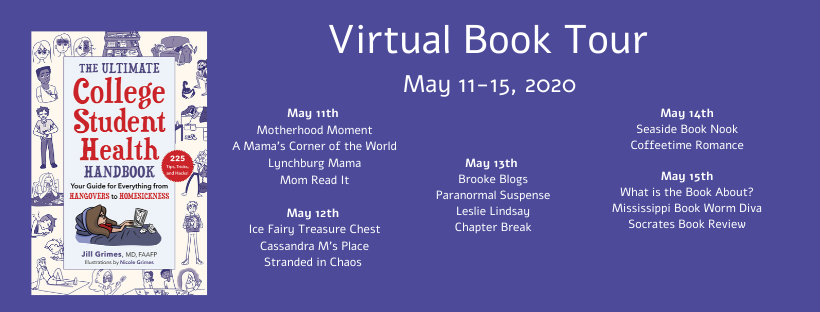
Virtual Book Tour Q&A
What inspired you to write The Ultimate College Student Handbook?
Around ten years ago, I started making personalized first aid kits as high school graduation gifts. Initially I included one index card with “cheat notes” about which medications to take when, but this expanded steadily as I tried to include answers to common texts that I received from these kids throughout the year. Before long, I was up to a twenty page booklet, and I realized I really needed to expand to an actual book. I’m continually delighted when parents tell me their now “grownup” kids are still asking for “first aid kit refills” even several years after their college graduation!
What is the best advice that parents can give their child before going off to college for the first time?
College will likely be the best years of your life so far...BUT there will still be bad DAYS and even weeks thrown in the mix. Many students have such high expectations that when the first disappointments hit (especially not making the club/Greek org they wanted, their first bad grade, not liking their roommate) it feels twice as devastating. Also, at first, join everything! Don’t wait for the “perfect” group. This is your chance to explore everything from political to service to quirky art clubs, and a wonderful time to meet people with totally different backgrounds and perspectives. As you settle in, you will quickly figure out which ones you enjoy and which ones you should drop.
What do you think parents should send in a college student’s first aid kit?
Please see the bonus DIY first aid kit section for the full shopping list and instructions, but start with a mid-range priced oral digital thermometer (around $8-12), an ACE wrap, “good” bandaids for fingers/heels, Tylenol, Advil, topical steroid cream (hydrocortisone), antibiotic cream/ointment (like Neosporin), a copy of your health insurance card and the date of your kid’s last tetanus shot (plus ideally a copy of all their immunizations).
What are five unexpected items that every college student should pack for college?
-
- Prescription glasses if you have them! (even though they only wear contacts, BRING THEM because with pink eye or any other eye problem, they will need their glasses and frequently students tell us it never crossed their mind to bring them to campus.)
- Heating pad- doubles as a heated blanket in cold climates, plus great for female menstrual cramps or back pain in anyone.
- Old fashioned reusable ice bag
- Small lock box for medications (especially if on ADD meds)
- Small tool kit (scissors, hammer, tape- invaluable on move in day!)
What are some of the most common medical issues that college students have? Any advice on how to prevent these things?
Challenging to summarize- but here are a few highlights:
-
- Infections (Colds, flu, strep throat, mono, food poisoning, “stomach flu”, STDs):
- Hand washing (full 20 seconds with soap! We can thank COVID that now everyone actually knows this!)
- Flu shot each year.
- Condoms/barriers every single time if sexually intimate in any fashion.
- Injuries (Sprains, fractures, concussions, lacerations and scrapes):
- Stop rushing! Bike accidents, trips, falls are all far more common when students push it till the last minute (too many snooze buttons) and race to class.
- Intoxication is the other common culprit- mostly alcohol and pot.
- Infections (Colds, flu, strep throat, mono, food poisoning, “stomach flu”, STDs):
Pro tip: becoming a more “awake” intoxicated person (by adding caffeine or nicotine) does NOT improve your reflexes nor decrease your chance of injury. You’re still an intoxicated person with impaired reflexes and judgment.
Any tips for getting over homesickness?
See second question above! GET INVOLVED with “everything” that might interest you initially, and volunteer for leadership positions like on dorm councils or freshman rep spots in club executive boards. The more involved you are (and the less time you spend in your dorm room), the less homesick you will be. Also, limit your social media browsing, because FOMO (Fear Of Missing Out) is quicksand, and seeing all your old friends looking “insta-perfect”-ly happy on all their posts (the same as you do on yours, by the way!) makes you feel left out.
Do you have any tips on how to prevent the Freshman 15 weight gain?
The “An Ounce of Prevention” topic goes into more detail, but briefly:
- Recognize the cause:
- College socializing initially revolves around high calorie, convenience/delivery foods like pizza and cookies
- Liquid calories are the biggest culprit- from Starbucks lattes or sodas to beer, margaritas and vodka shots.
- Activity level drops dramatically from high school for most students- especially dancers, traditional athletes (football, basketball, track) and marching band.
- Be proactive with prevention:
- Join intramural sports (great for socializing too!)
- “Count” liquid calories and balance with increased activity
- Have accountability- weigh or try on a pair of non-stretchy shorts or jeans every Sunday night
- Plan study breaks around walking with a friend (rather than playing games on your phone or grabbing a candy bar)
- Consider twice/month personal training sessions at your university gym (many offer great student pricing!)
How can students take care of themselves mentally? Do you have any suggestions for managing stress?
Anxieties are super common- from fear of using public bathrooms (often leading to constipation and stomach pain) to text anxiety and/or fear of public speaking. Much to say, but again, a few highlights:
- Do NOT wait till you crash and burn to seek help!! This is true whether it means going to tutoring for a class you’re struggling with or to counseling to figure out strategies to help with public speaking or other fears. Trust me, professors know the most successful college students by their first names, because those are the kids that show up for tutorials.
- Insomnia may be the most common warning sign- go in and talk to your doctor if you cannot fall asleep or if you wake up early and can’t go back to sleep. It’s virtually impossible to deal with anxiety if you can’t get a decent night’s sleep.
- Daily aerobic exercise (30 minutes of anything that elevates your heartrate- walking, biking, elliptical, zumba, basketball…) is equivalent to a low dose of an antidepressant! So important to help relieve stress.
- Many students consciously or unconsciously try self-medicating with alcohol or pot…which makes things worse. Bottom line: although these substances are sedating in their immediate action, they actually exacerbate insomnia (cause poor quality, unrestful sleep) and often very significantly worsen anxiety.
Anything else you would like to add?
There are a few topics I included because students can’t be concerned about what they don’t know is a potentially serious issue- like when back pain and shortness of breath with no injury might be a partially collapsed lung, or chest pain in someone taking female hormones (like birth control) could be a potentially lethal blood clot in your lungs. Rest assured these events are far less common, but we never want to miss one.
Additionally, I really hope parents will take the time to read “Smoking, Vaping, and What You Might Not Know About Pot” because trust me, things have changed in twenty or thirty years, and I’d like everyone to be on the same page. Ditto for the chapters on tattoos, piercings, STDs and sexual assault. My hope is to spark mature, informed discussions about these topics to best prepare our kids for the college environment and beyond.
 The Ultimate College Student Health Handbook: Your Guide for Everything from Hangovers to Homesickness – by Jill Grimes, MD, FAAFP
The Ultimate College Student Health Handbook: Your Guide for Everything from Hangovers to Homesickness – by Jill Grimes, MD, FAAFP
Blurb: The COVID pandemic has focused our attention on health like never before, and soon millions of students will graduate from high school, excited to fly the nest and begin their college careers. As these young people begin to take responsibility for their own health, they will be dealing with the added challenges of issues like homesickness, close quarters of dormitories, test anxiety, and even hangovers, in addition to illness and injuries. As a physician working part-time in the University Health Services at The University of Texas, and as a mother of two college students, Grimes began writing helpful tips and creating first aid kits for common college ailments, which steadily evolved into The Ultimate College Student Health Handbook (May 5, 2020, Skyhorse Publishing).
Dr. Grimes makes it clear from the beginning: the book is not intended to replace your next doctor appointment.
However, armed with quality information, students will know when to seek medical help, how to describe their
condition, what questions to ask, and what dorm-friendly tips and tricks might help before they are seen. The book is
organized literally from head to toe and goes far beyond “Dr. Google” to provide the knowledge of evidence-based
medicine every college student should know.
“Parents should buy two copies of this book–one for themselves and one for their college bound teenager!” – Julie K. Silver,
MD, Associate Professor at Harvard Medical School
“This is an essential guide to health and wellness when you head off to college…and your mom can’t be there to hold your
hand and take care of you.”- Ari Brown, MD, FAAP, Best Selling Author of Baby 411 Book Series.
About the Author
Note: Some posts may contain affiliate links. Should you choose to purchase a product, we will receive a small commission for the sale at no additional cost to you. Chapter Break is a participant in the Amazon Services LLC Associates Program, an affiliate advertising program designed to provide a means for sites to earn advertising fees by advertising and linking to Amazon.com.




Thank you for sharing the inspiration behind “The Ultimate College Student Handbook!” It’s truly commendable how your journey started with personalized first aid kits and evolved into a comprehensive book. Your advice about managing expectations in college is spot-on; those early disappointments can be tough, but they’re a part of the learning experience. And your tips for what parents should include in a college student’s first aid kit are invaluable – practical and thoughtful. Your dedication to helping students navigate this phase of life shines through in your work, and it’s much appreciated!